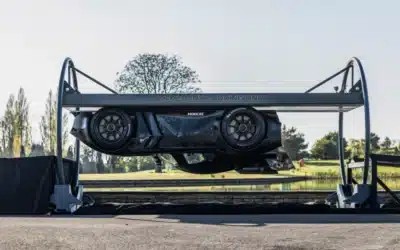The dream of electric flying cars is inching closer to reality. They have long been the stuff of science fiction movies and futuristic imaginations. However, recent advancements in technology and growing concerns about urban congestion have spurred many companies to invest heavily in this emerging market and bring the dream to life.
Companies such as Doroni Aerospace and Alef Aeronautics have made significant strides in the development and certification of electric flying cars. In a recent groundbreaking achievement, CEO Doron Merdinger of Miami-based Doroni Aerospace successfully piloted a two-seater personal vertical takeoff and landing (eVTOL) aircraft that can conveniently fit in your garage.
Meanwhile, Alef Aeronautics, an automaker based in California, announced that it has received a Special Airworthiness Certification from the Federal Aviation Administration (FAA) for its Model A flying car. This certification marks a significant milestone as it is the first approval ever granted for a flight-capable car in the USA.
This approval signifies that the vehicle meets all necessary safety standards required for flight operations. It demonstrates Alef’s commitment to ensuring both user safety and compliance with aviation regulations.

Alef Aeronautics’s electric flying car. Photo courtesy of Alef.
Alef CEO Jim Dukhovny said: “It allows us to move closer to bringing people an environmentally friendly and faster commute, saving individuals and companies hours each week. This is one small step for planes, one giant step for cars.”
The certification process carried out by the FAA involves rigorous testing procedures aimed at assessing various aspects such as airworthiness standards, structural integrity, propulsion systems performance, emergency response capabilities, among others. By successfully navigating through this process, Alef Aeronautics has proven the reliability and safety of its electric flying car. The advent of electric flying cars holds tremendous potential for revolutionizing transportation.
The Alef flying car is able to take off vertically or horizontally, and can carry up to two people. It’s expected to have a road range of 200 miles and a flying range of 110 miles.
Doroni Aerospace’s eVTOL aircraft represents a major leap forward in personal aviation. With its compact design and ability to fit into standard garages, this electric flying car offers unparalleled convenience for users. The successful test flight conducted by CEO Doron Merdinger showcases the viability and potential of these vehicles for everyday use.
Dubai is set to become one of the first cities in the world to see flying cars in mainstream use. It hopes to launch its “aerial ridesharing” service by 2026. The vehicles will be a six-rotor electric flying taxi made by Joby Aviation, which is headquartered in Santa Cruz, California. They will provide vertical take-off and landing, with zero emissions.
Electric flying cars hold immense potential not only for personal transportation but also for various other applications such as emergency medical services or aerial surveillance. They can also provide a solution to the growing problem of urban congestion by taking advantage of the vertical dimension – taking off without a runway – and offering efficient point-to-point travel. Furthermore, they can significantly reduce carbon emissions associated with traditional modes of transportation, contributing to a more sustainable future.
While there are still significant challenges to overcome before electric flying cars become truly mainstream, advancements in technology have made them more feasible than ever before. The utilization of advanced materials, such as lightweight composites and carbon fibers, allows for increased efficiency and range.
Additionally, advancements in battery technology have improved energy storage capabilities and reduced charging times. However, there are several hurdles that need to be addressed before electric flying cars can take off on a large scale. Infrastructure development is one such challenge – building landing pads or “vertiports” across cities will be crucial in facilitating convenient takeoff and landing locations for these vehicles.
Regulatory frameworks also need to be established to ensure safe operation and address concerns related to airspace management. Despite these challenges, the successful testing and certification achievements by Doroni Aerospace and Alef Aeronautics and the continued commitment of cities such as Dubai represent significant progress towards making electric flying cars a common sight in our skies.











